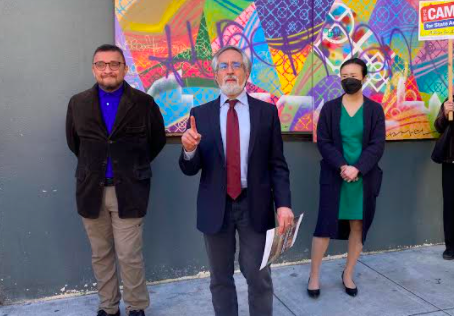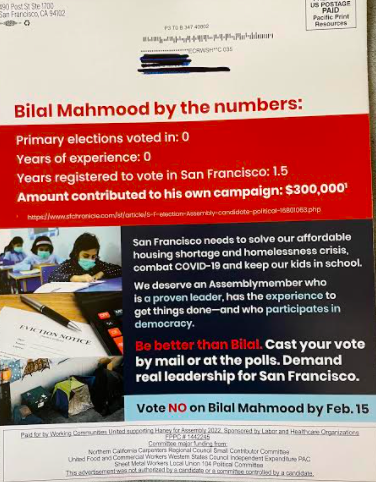Election Day, such as it is, is less than a week away, and all of the Assembly campaigns are doing final get-out-the-vote pushes. But the reality is, I suspect, that most people have already voted. I doubt more than 20 percent of the ballots will be cast at voting places Feb. 15.
Still, the independent-expenditure committee supporting Sup. Matt Haney just dropped a mailer attacking David Campos, which might be a little too late—and, like many of these hit pieces, is a bit lacking in factual accuracy.
The same committee is also attacking Bilal Mahmood—a sign that Haney’s allies are worried that the newcomer is making headway.

Let me start with a bit of semantics, language that continues to annoy me. The anti-Campos mailer says that Haney “created over 5,000 new housing units for District 6.” On his website, it’s even worse: Haney “built more housing, including affordable housing, in his district than any other.”
For the record: Matt Haney hasn’t built any housing. He hasn’t created any housing. I have never seen him buy a piece of land, go through the permit process, or work on a job site with a hard hat, pouring concrete, cutting boards, or hammering nails.
The supervisors don’t build housing. Sadly, the city of San Francisco doesn’t build housing. Private developers build housing. The Planning Commission gives them permits, and the supervisors sometimes hear appeals of those permits, and allow the housing to move forward (the vast majority of the time) or on rare occasions reject it.
The only role Haney—or any supervisor—has in building housing is voting on appeals of Planning Commission decisions (and working with neighbors and community groups to cut deals to get private development projects approved), changing zoning laws, or organizing for and approving money for affordable housing projects. Haney has always been a supporter of affordable housing, but he has not funded, promoted, or been responsible for 5,000 new units of 100 percent affordable housing in his district. Most of that is private market-rate housing.
The fact that we are relying on the private sector to address the housing crisis is, and has long been, a serious problem.
So let’s at least be honest about that.
The mailer says that Campos “voted against creating 7,000 new housing units” and “banned the creation of new affordable housing in his own district.”
None of that is even remotely true. Campos did, at one point, discuss a short-term moratorium on market-rate—and only market-rate—housing in the Mission. He did it because the community was overwhelmingly united behind the idea that luxury housing was gentrifying and damaging the neighborhood:
The existing zoning, under the Eastern Neighborhoods Plan, “has failed the Mission,” he said, pointing out that 8,000 Latino residents have been lost in the past decade. The population of the Mission was 52 percent Latino a decade ago; now it’s down to 40 percent.
“Our working people, families, youth, and seniors have been displaced,” he said. “People have come together to say enough is enough.”
There’s a lot of new housing online for the Mission – but virtually none of it is affordable. Some 93 percent of all the new units proposed or under construction in the neighborhood will fall into the category of market-rate, which in the vast majority of cases is out of the reach of most neighborhood residents.
The moratorium would have lasted exactly 45 days. The measure specifically exempted affordable housing projects.
The measure needed nine votes. It got seven, so it never happened. So he never “banned the creation” of anything. But this was hardly a radical concept—and then-Sup, now Mayor London Breed voted in favor.
Although the measure needed nine votes, Sups. John Avalos, David Campos, Jane Kim, Eric Mar, London Breed, Malia Cohen, and Norman Yee voted yes.
Sups. Scott Wiener, Julie Christensen, Katy Tang, and Mark Farrell voted no.
That’s right: Mayor Breed, who is a Yimby favorite, supported this idea.
It also says Campos “is leading the charge” against a project in Soma. Campos wasn’t on the board. He never once testified on the issue. He never called anyone to lobby on it. After the fact, he said he agreed with the majority on the board. That would be an 8-3 majority.
Among those who voted against it was Board President Shamann Walton, who has endorsed Haney.
Of course, there’s no evidence the project would ever get built anyway:
At one point, under questioning, an executive from the developer, Build Inc., acknowledged that there is currently no financing for the project and the company doesn’t even own the land. Founding Partner Lou Vasquez said that he couldn’t predict how much the new units would rent for because “we don’t own the site or have financing in place to build it.
The supes didn’t even know how to respond. “I think that silence is from shock,” Sup. Shamann Walton noted.
Just FYI, there’s nothing that anyone in the state Legislature can do to “build” 100,000 new housing units in San Francisco or anywhere else—unless they can convince the governor to put about $25 billion or more every year into paying for the construction of social (non-market) housing.
You can loosen local zoning rules, as Sup. Scott Wiener has been doing, but developers will build when they can make enough profit—and the minute prices for housing come down to the point that most San Franciscans can afford it, that profit will drop below the point where the international capital that funds housing will put up the money.
So the idea that eliminating zoning rules will mean more affordable housing just doesn’t, as the developers say, pencil out.
But let’s have that discussion. What policies might actually encourage the construction of housing that working people in San Francisco can afford?
You don’t get that in attack ads.

The other attack on Campos is coming from the California Association of Realtors, and it’s more of the same: Campos blocked new housing. They don’t point to a single project in District 9 that Campos “blocked;” again, the supes don’t issue permits, and they only hear cases that are appealed to the board, and I can’t think of a single instance when a D9 project was rejected.
Sup. Aaron Peskin was among those who showed up at a rally outside the San Francisco Board of Realtors this week to respond. The realtors have put up $300,000 to attack Campos.
It must be election season because we are all gathered where we all seem to gather at the Board of Realtors … The board and their staff are feeling quite guilty about the role that they have played as a parasite in SF making money from evictions and they want to keep that financial gravy train going.
So are, there is no IE supporting Campos or attacking any of the other candidates.
Haney, who as a sitting member of the Board of Supes can’t take money from anyone with business before the city, has now had to return $45,000 in contributions, most from developers. He told me “we followed all ethics rules and refused all contributions as soon as we identified the people who aren’t able to give, a few of which can’t contribute because they serve on nonprofit boards.”
But they all tried to give him money.
This campaign contribution business is complicated: It’s not likely that a single donation from a single developer will influence a politician to vote a certain way (although some of the sleazier folks in office have shown that they will). But when someone gives you $5,000, you are more likely to take that person’s phone call, which is, of course, why developers and lobbyists donate money.
But there’s a deeper point here. The people who give $100 do that because they believe in a candidate’s vision and political mission. The big money comes from people who believe that candidate will, overall, be more supportive of their agendas.
That’s why, sadly, it matters who is giving big money to candidates. In a better world, all campaign financing would be public, but in this world, you can tell a lot about a candidate by who their financial supporters are.
Meanwhile, Mahmood: A mailer from the same committee that is attacking Campos just dumped a piece—again, probably way too late to have any real impact—blasting Mahmood for never voting in a local election. He’s only been registered to vote in San Francisco for a year and a half.

That’s a classic kind of hit piece, and if it had come out three weeks ago, when people were starting to vote, I think it might have hurt Mahood.
But they didn’t send it out until this week, which suggests something else:
These big IEs are polling constantly. They target their messages to what the trends are showing. And my guess is that the polls are showing Mahmood, who has put $500,000 of his own money into the campaign, is getting traction, including among potential Haney voters.
We will see Tuesday night.




